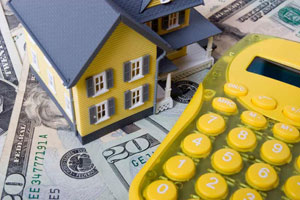What Do I Need To Know About Private Mortgage Insurance?
By Gretchen Wegrich Updated on 7/27/2017
Although PMI (mortgage insurance) may not be the most popular form of insurance for some homeowners, for many, it's a must.
Thousands of hopeful homeowners are unable to afford the hefty 20 percent down payment, making PMI a useful foot-in-the-door, allowing for home ownership with as little as a 0-5 percent down payment.
Default protection
PMI mortgage Insurance is insurance that protects your lender against non-payment if you default on your home loan. The primary purpose for mortgage insurance is to protect your lender, as they carry more risk than the average homeowner.
You pay the premiums to protect your lender is protected. Lenders often require PMI mortgage insurance due to the higher level of default risk that's associated with low down payment loans.
Consequently, its only benefit to you is a lower down payment mortgage.
Although the average costs of mortgage insurance premiums vary, typically they fall between one-half and one percent of the loan amount, depending on the size of the down payment and loan specifics. On a $200,000 loan with a $10,000 down payment, you might expect to pay somewhere around $85 a month, or about $1000 a year, in addition to your mortgage payment.
However, unlike your mortgage interest, these premiums are not always tax deductible.
Mortgage insurance is one of the few types of insurance products that don't underwrite its premiums based on individual default risk. Rather the size of the borrower's mortgage and the amount of money put down determine the mortgage insurance quote. Therefore, two individuals, regardless of credit, with the same mortgage amount and down payment can expect to pay about the same mortgage insurance premium.
PMI versus MPI
Private mortgage insurance and mortgage protection insurance are often confused. Though they may sound similar, they're two different types of insurance products.
Mortgage protection insurance is essentially a life insurance policy designed to pay off your mortgage in the event of your death. However, private mortgage insurance protects your lender, allowing you to finance a home with a smaller down-payment.
These two products should never be mistaken as substitutes for each other.
Don't like the idea of making those extra mortgage insurance payments? Want to get rid of them altogether? Here are a few ways to eliminate PMI mortgage insurance:
Appraisal
If you are one of the lucky few whose home value has risen in recent years, you may be able to terminate your mortgage insurance. Once the equity in your home falls below the 80 percent loan-to-value-ratio required by your lender, you have the ability to eliminate your private mortgage insurance.
You will have to present your lender with a valid home appraisal before final termination. Keep in mind, the costs associated with getting an appraisal may or may not be worthwhile, depending on your unique mortgage situation.
Remodel
This falls under the same principle as above. By making home improvements you increase the market value of your house, getting you that much closer to the all-important 80 percent level.
Pay down your mortgage
Paying down your mortgage is the most direct way to move past paying mortgage insurance. Making even small additional payments each month can make a huge difference over time.
Piggyback loan
Utilizing a piggyback loan, often known as an "80/20 loan", will allow you to avoid private mortgage insurance. Also, by doing so, you typically avoid any out of pocket down payment, with the added benefit of a tax deduction.
By piggybacking a second mortgage onto your first mortgage, you're achieving the desired 80% loan to value on the first mortgage and avoid the PMI.
Keep in mind though, the downside with these types of mortgage vehicles is that the second mortgage usually comes at a substantially higher interest rate, making the mortgage insurance savings negligible. However, by utilizing an 80/10/10 type loan with the last 10 percent going towards the down payment, you'll often pay less than a straight loan with mortgage insurance.
Automatic termination
Thanks to The Homeowner's Protection Act (HPA) of 1998, you now have the right to request private mortgage insurance cancellation when you reach a 20 percent equity in your mortgage.
Lenders are required to automatically cancel PMI coverage when a 78 percent loan to value is reached as well--but there are some exceptions to these provisions, such as liens on property or not keeping up with payments, which may require further PMI coverage.
Private mortgage insurance has proven invaluable for families trying to attain the American dream of homeownership. It affords these individuals an opportunity that isn't always easily achieved in a bogged down real estate market. Paying more or longer than needed isn't prudent, however, and it's highly recommended that all steps are taken to avoid unnecessary payment.
Lender 411 has addtional resources to help you familiarize yourself with your mortgage, PMI, and other financial points of homeownership.

Didn't find the answer you wanted? Ask one of your own.
-
 What is Private Mortgage Insurance (PMI) ?
View More
What is Private Mortgage Insurance (PMI) ?
View More
Related Articles
Ask our community a question.
Searching Today's Rates...

Featured Lenders
Lisa Stepp
RBS Citizens
Clifton Park, NY
Cameron Burke
Vision One Mortgage
Huntington Beach, CA
Kat Whitman
Whitman Met, Inc.
Sacramento, CA

